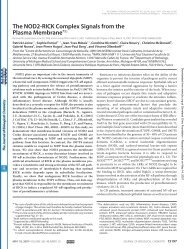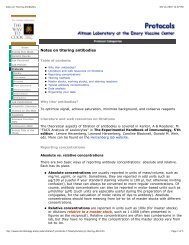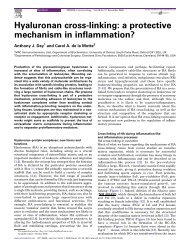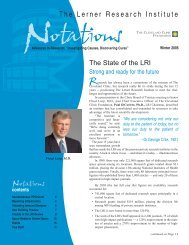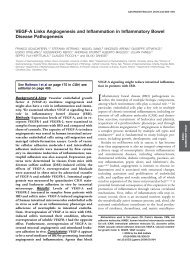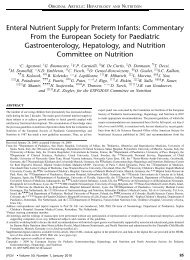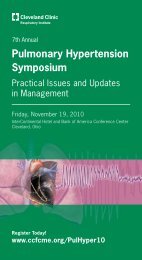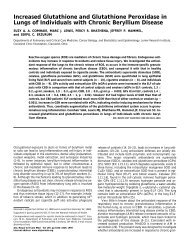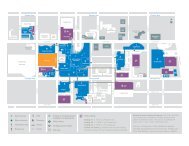Scientific Report 2003-2004 - Cleveland Clinic Lerner Research ...
Scientific Report 2003-2004 - Cleveland Clinic Lerner Research ...
Scientific Report 2003-2004 - Cleveland Clinic Lerner Research ...
- No tags were found...
Create successful ePaper yourself
Turn your PDF publications into a flip-book with our unique Google optimized e-Paper software.
MOLECULAR BIOTECHNOLOGY COREThe Molecular Biotechnology Core laboratory provides consultation and technical support servicesin DNA sequencing protein analysis, peptide chemistry, amino acid analysis, and bioconjugate chemistry.These services are made available to all investigators of the <strong>Lerner</strong> <strong>Research</strong> Institute and the <strong>Cleveland</strong><strong>Clinic</strong> Foundation.High-throughput DNA sequencing systems based on capillary electrophoresis have revolutionizedthe genome sequencing projects dramatically in the last several years. The blueprints of human,Arabidopsis, Caenorhabditis elegans, Drosophila, yeast, Escherichia coli, Haemophilus influenzae, and severalother microbial genomes have now been sequenced. Similarly, the huge data-processing power ofcomputers and increasing availability of powerful laboratory data management software in recent yearshas made annotation of genome sequences possible in databases. This has stimulated mining of databases,using powerful technologies such as high-throughput mapping of single-nucleotide polymorphisms(SNPs) through the entire genome. SNPs are expected to provide clues to predisposition to disease andresponse to drugs. As a consequence, life scientists are using DNA sequencing as a routine researchpractice in their laboratories to understand fundamental biological processes at molecular level. Therefore,DNA sequencing will continue to be a major task in the foreseeable future as gene sequences aresurveyed more often. In the post genome era, the Molecular Biotechnology Core laboratory at the <strong>Lerner</strong><strong>Research</strong> Institute will continue to play an important role by providing crucial research support in theareas of customized DNA sequencing and SNP identification. The DNA sequencing samples submittedby CCF investigators to the Core has increased steadily. To meet this demand, a MegaBACE 1000workstation, which uses capillary array electrophoresis, became operational in January 2001.The core laboratory also offers N-terminal amino acid sequence analysis by Edman degradationchemistry and amino acid composition analysis by the orthophthalaldehyde (OPA) method. Facilities forin-gel digestion and peptide separation (mapping) of N-terminal blocked protein for internal peptidesequence analysis are available, although mass spectrometry is lately becoming a method of choice inprotein identification. In the area of peptide chemistry, the laboratory performs peptide synthesis by thesolid-phase method using Fmoc chemistry. To exploit the full potential of synthetic peptides in biomedicalresearch, the Core laboratory has an ABI 431A synthesizer (Applied Biosystems) and an Omega 396multiple peptide synthesizer (Advanced ChemTech). With the installation of the new 396 Omegamultiple peptide synthesizer, CCF investigators have the flexibility of synthesis at the 50-, 100- or 250-mmole scale. Every peptide synthesized is rigorously evaluated routinely by mass spectrometry, HPLCanalysis and by N-terminal sequencing if necessary with the ultimate goal of providing the correctintended peptide sequence to the investigator.MOLECULARBIOTECHNOLOGYCOREDIRECTORSatya Yadav, Ph.D.SCIENTIFIC ADVISOREDWARD PLOW, PH.D.SUPPORT PERSONNELTalat Haqqi, M.S.Adriana Panciu, B.S.Wei-Zhen Shen, B.S.Xiaolan Zhao, M.D.Web site: http://www.lerner.ccf.org/services/molecbiotech/VIRUS COREThe Virus Core Facility provides services and expertise, including scientific consultations, relatedto infectious and noninfectious viruses. The Core provides such essential services as making virus stocks,inducing large-scale expression of cloned proteins in baculovirus, constructing retroviral and adenoviralvectors expressing cDNAs, and making respective recombinant virus stocks.Currently, the core maintains the following virus stocks: Human immunodeficiency virus (HIV-1), respiratory syncytial virus (RSV), parainfluenza virus (PIV), recombinant baculovirus, adenovirus,retrovirus and other viruses as requested. For protein expression in baculovirus, primary services includeconstructing recombinant baculovirus expressing cloned cDNA (with or without His-tag), makingrecombinant virus and performing small-scale infections to characterize gene expression, determining theoptimum conditions of harvest time and infection ratio that gives maximum protein yield, and carryingout large-scale infection to produce large quantities of protein. The Core also offers a complete range ofservices for the construction of recombinant adenoviruses, including cloning, plaque purification,screening, amplification, double cesium chloride gradient purification, and viral particle titration.The Virus Core Facility is involved in new collaborative projects that will generate valuableresearch materials for the research institute. The Virus Core has trained numerous scientists in how togenerate recombinant baculoviruses, adenoviruses and retroviruses and has designed experiments fortheir research work. We are also in the process of making new adenoviral vectors that will regulate geneexpression in a tissue-specific manner.VIRUS COREDIRECTORRatan K. Maitra, Ph.D.SCIENTIFIC CONSULTANTSAmiya K. Banerjee, Ph.D.Joseph DiDonato, Ph.D.SUPPORT PERSONNELDonald R. RempinskiWeb site: http://www.lerner.ccf.org/services/virus/183



